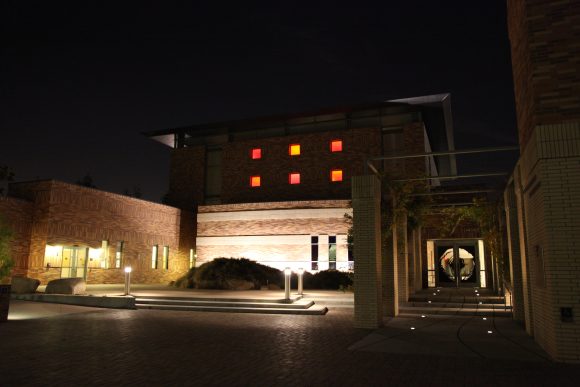
We grieve the things we never even had, a friend once said to me after I had experienced a profound loss. Indeed, we grieve the future we were imagining, planning toward, or counting on. In normal times, we spend much of our time engaging in anticipatory causality, a term coined by Sara Ahmed, author of “The Promise of Happiness.” We spend time in the present working toward what we anticipate will cause greater happiness in the future. Indeed, what we were spending our time on pre-Covid-19, especially in education, was often almost entirely based upon on building for the future – working toward a college degree, finishing a research deadline, planning for Commencement Weekend, or applying for jobs.
So, yes, that feeling you’re having inside right now just may be grief. We’re grieving the loss of achievement, of gatherings, of time we thought we would have.
This particular grief we feel even has a name: anticipatory grief, according to David Kessler, author of “Finding Meaning: The Sixth Stage of Grief.” We are experiencing it collectively. We are suffering from it individually. Stages of grief are not linear but weave in and out and do not even always occur in this order: denial, anger, bargaining, depression, and acceptance. You may have experienced more than one in recent weeks.
We’re afraid we’ve missed out on time, or that now we’ll waste time, and don’t know how to schedule our time like we did while at work or school. Yet, time is not something we have or can manipulate – time is that which we live within; the atmosphere and fluidity we move through. I learned from my friends and researchers from the Institute for Quantum Studies at Chapman University when we co-sponsored Time and Becoming, a Conference on Religion and the Sciences at the Fish Interfaith Center, that laboratory experiments show that the present is influenced by the past, but the present is also influenced by the future. Don’t ask me to explain that. But in our minds it kind of makes sense, doesn’t it: the future is totally affecting the present as we grieve anticipated future losses.
It does feel like we have lost time itself. No one possesses time, writes Abraham Joshua Heschel, author of “The Sabbath.” In this classic and beautiful work, Heschel distinguishes between time and space, the latter of which is made up of materiality and the things we do have and can manipulate. We share time, we own space, he writes. Time is a realm shared by all of humanity.
So what do we do as we move through this time, together? Three suggestions: first, go ahead and grieve. As you experience feelings of anger or depression, know this is natural right now. Anticipatory grief is real – we are losing the things of space and materiality we thought we would have, and our world will never quite be the same again. Name it, and be aware that you are not alone. Do reach out to others for help.
Second, ground in the present time that you are actually living, even for brief moments. Our minds take us to worst-case scenarios, which are pretty bad right now. Let go of that which is not yet, and gently settle into the present. Try this: take five conscious, deep breaths. Become aware of your body – how your chest and abdomen move as you breathe. Notice the chair you are sitting on. Realize: I am breathing and in my body. I have a safe place to sit. My neighbors are tucked in their apartments or houses nearby, and most people around me are well. Our physical distancing is working. In this moment, this is what is real.
Third, take this time to pause and to reflect upon meaning and what brings true happiness. Much of what we were anticipating in order to cause future happiness, as Ahmed points out, may have been what we thought we should be pursuing because of societal pressure. All the while, it is possible that what brings true happiness and meaning may be emerging right before us. David Kessler names finding meaning the sixth stage of grief. He describes finding meaning as not the same as explaining why this is all happening, like why some people are losing wages or falling seriously ill. Meaning is, rather, what we create in the midst of time, in time, out of the emotional and material loss.
Allow grieving, be present, pause to reflect, and meaning may emerge. On a discussion board for a class I teach, one student is taking time daily to meditate, something he wanted to do before but never found the time, and is discovering it helps expand his sense of time. He writes: It almost feels like I’m cheating, because I’m investing my time to effectively experience MORE time in my life. A faculty member shares in an email that in these short weeks at home, he is finding it enriching to have time to be closer to his children to, in his words, reimagine with them. We are finding new appreciation for others present in our lives – another faculty person who is teaching her children at home while also teaching college students online, says she is ready for us to pay elementary teachers far more, because she now truly appreciates their work. We are finding new appreciation for the earth, as we witness healing is possible in just a few short weeks as the air clears over cities, and dolphins swim more freely.
The Sabbath day, in Jewish practice, is a day for pausing and reflection, just as God rested within time and paused on a seventh day to call creation good. Experiencing Sabbath allows one, Abraham Heschel writes, to become attuned to holiness in time, to turn from the results of creation to the mystery of creation. Allow yourself to experience this time. Acknowledging grief and healing from grief will occur in time. Attuned with time, we may even find new meaning.


